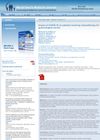 4 citations,
October 2021 in “Canadian Journal of Physiology and Pharmacology”
4 citations,
October 2021 in “Canadian Journal of Physiology and Pharmacology” Women with pancreatic cancer are more likely to have certain side effects from chemotherapy than men.
 1 citations,
February 2023 in “Daehan ui'sa hyeobhoeji/Daehan uisa hyeopoeji”
1 citations,
February 2023 in “Daehan ui'sa hyeobhoeji/Daehan uisa hyeopoeji” Primary healthcare clinics are key in managing chemotherapy side effects using various medications and treatments.
 December 2023 in “Frontiers in oncology”
December 2023 in “Frontiers in oncology” Older ovarian cancer patients live longer and tolerate weekly chemotherapy better than three-weekly treatments.
 November 2021 in “World Family Medicine Journal /Middle East Journal of Family Medicine”
November 2021 in “World Family Medicine Journal /Middle East Journal of Family Medicine” COVID-19 affects patients on chemotherapy for gynecological cancer negatively.
 14 citations,
October 2003 in “Annals of Oncology”
14 citations,
October 2003 in “Annals of Oncology” About half the patients treated with capecitabine and docetaxel developed severe hand-foot syndrome.
 522 citations,
January 2001 in “Cancer investigation”
522 citations,
January 2001 in “Cancer investigation” Doxil is an effective, modified chemotherapy drug with a unique toxicity profile and shows promise in treating certain cancers.
2 citations,
September 2022 in “Annals of Oncology” Mirvetuximab soravtansine improves quality of life and reduces symptoms more than standard chemotherapy in ovarian cancer patients.
 July 2022 in “International Journal of Applied Pharmaceutics”
July 2022 in “International Journal of Applied Pharmaceutics” The optimized caffeine formula improved hair growth and penetrated all skin layers.
 November 2021 in “Research Square (Research Square)”
November 2021 in “Research Square (Research Square)” The new caffeine cream works better for hair growth than existing products.
 October 2021 in “International journal of basic and clinical pharmacology”
October 2021 in “International journal of basic and clinical pharmacology” Excessive eyelash growth from erlotinib may indicate positive tumor response and help treat madarosis.
Fenugreek seeds and Butea monosperma flowers may help reduce hair loss from chemotherapy.
September 2011 in “European journal of cancer”  172 citations,
November 1983 in “Journal of The American Academy of Dermatology”
172 citations,
November 1983 in “Journal of The American Academy of Dermatology” Chemotherapy can cause skin problems like hair loss, mouth sores, and skin darkening, and recognizing these can affect treatment decisions.
114 citations,
October 1996 in “Dermatologic clinics” Hair loss is mainly caused by hormones, autoimmune issues, and chemotherapy, and needs more research for treatments.
 70 citations,
January 2000 in “Drug Development Research”
70 citations,
January 2000 in “Drug Development Research” New butyric acid prodrugs show promise for cancer treatment, anemia management, and protecting hair from chemotherapy damage.
 60 citations,
October 2005 in “Experimental Dermatology”
60 citations,
October 2005 in “Experimental Dermatology” Zinc can both inhibit and stimulate mouse hair growth, and might help recover hair after chemotherapy.
 53 citations,
May 2001 in “The American journal of the medical sciences”
53 citations,
May 2001 in “The American journal of the medical sciences” Chemotherapy can cause various skin problems, and recognizing them helps improve patient care.
 53 citations,
June 1982 in “The BMJ”
53 citations,
June 1982 in “The BMJ” Cooling the scalp below 22°C before and during chemotherapy can help prevent hair loss.
52 citations,
May 2011 in “APOPTOSIS” Hydroxyl radicals cause hair follicle cell death during chemotherapy by reducing Bcl-2 protein levels.
 49 citations,
October 1994 in “Annals of Oncology”
49 citations,
October 1994 in “Annals of Oncology” Minoxidil not effective in preventing chemotherapy-induced hair loss.
 47 citations,
July 2005 in “British Journal of Dermatology”
47 citations,
July 2005 in “British Journal of Dermatology” Topical vitamin D3 does not prevent hair loss from chemotherapy.
 44 citations,
September 2015 in “Annals of Oncology”
44 citations,
September 2015 in “Annals of Oncology” Targeted cancer therapies have a significant but lower risk of causing hair loss compared to chemotherapy.
40 citations,
September 2007 in “Bone marrow transplantation” Certain chemotherapy drugs can cause permanent hair loss in stem cell transplant patients.
 26 citations,
January 1992 in “Cancer investigation”
26 citations,
January 1992 in “Cancer investigation” N-acetylcysteine and ImuVert can prevent hair loss in rats caused by chemotherapy.
 21 citations,
October 2018 in “European Journal of Pharmacology”
21 citations,
October 2018 in “European Journal of Pharmacology” Chemotherapy can cause brain inflammation and damage, and understanding this process could help manage side effects.
 19 citations,
November 2018 in “Nutrients”
19 citations,
November 2018 in “Nutrients” Annurca apple extract may protect mouse hair from damage by chemotherapy and could help treat hair loss without promoting cancer growth.
 19 citations,
July 2015 in “Journal of Ginseng Research”
19 citations,
July 2015 in “Journal of Ginseng Research” Korean Red Ginseng may protect against hair loss caused by chemotherapy.
 18 citations,
December 1996 in “Seminars in Cutaneous Medicine and Surgery”
18 citations,
December 1996 in “Seminars in Cutaneous Medicine and Surgery” Chemotherapy and cytokine therapy can cause various skin reactions, including hair loss and hypersensitivity.
 17 citations,
January 2019 in “Journal of cancer”
17 citations,
January 2019 in “Journal of cancer” The formula YH0618 can reduce the harmful side effects of the chemotherapy drug Doxorubicin and protect healthy cells.
 17 citations,
July 1995 in “International Journal of Dermatology”
17 citations,
July 1995 in “International Journal of Dermatology” Minoxidil helps prevent hair loss from chemotherapy in rats.
























